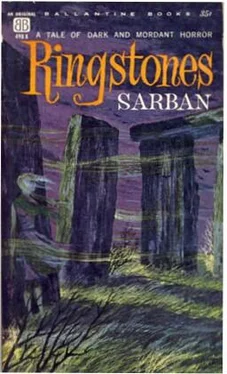Сарбан - Ringstones
Здесь есть возможность читать онлайн «Сарбан - Ringstones» весь текст электронной книги совершенно бесплатно (целиком полную версию без сокращений). В некоторых случаях можно слушать аудио, скачать через торрент в формате fb2 и присутствует краткое содержание. Жанр: Ужасы и Мистика, на английском языке. Описание произведения, (предисловие) а так же отзывы посетителей доступны на портале библиотеки ЛибКат.
- Название:Ringstones
- Автор:
- Жанр:
- Год:неизвестен
- ISBN:нет данных
- Рейтинг книги:3 / 5. Голосов: 1
-
Избранное:Добавить в избранное
- Отзывы:
-
Ваша оценка:
- 60
- 1
- 2
- 3
- 4
- 5
Ringstones: краткое содержание, описание и аннотация
Предлагаем к чтению аннотацию, описание, краткое содержание или предисловие (зависит от того, что написал сам автор книги «Ringstones»). Если вы не нашли необходимую информацию о книге — напишите в комментариях, мы постараемся отыскать её.
Ringstones — читать онлайн бесплатно полную книгу (весь текст) целиком
Ниже представлен текст книги, разбитый по страницам. Система сохранения места последней прочитанной страницы, позволяет с удобством читать онлайн бесплатно книгу «Ringstones», без необходимости каждый раз заново искать на чём Вы остановились. Поставьте закладку, и сможете в любой момент перейти на страницу, на которой закончили чтение.
Интервал:
Закладка:
So we packed our rucksacks that evening and asked Mr. Debourg, with a firmness which I hoped I should feel the next morning also, to call us at five−thirty.
(2)
I tried to finish my night's rest in the bus, but it was a gesture—a bit of pitiful human defiance of the pitiless mechanical gods—and nothing more. It is perfectly logical, I suppose, that the more and bigger machines there are, the less room there is on this earth for human beings. But I do sometimes mildly wonder why it is that, although roads grow monthly wider and motor vehicles more enormous, though the adjectival noun 'luxury' is applied as a matter of course to the substantive 'coach', all the technical skill of the modern factory, backed presumably by centuries of experience in making things to measure for the human frame, has not succeeded in producing a bus where the leg−space is not one inch shorter than the average human femur and the seat space by just about the same amount too narrow to accommodate two average human pelvises placed side by side. Before Piers and I reached Staineshead the correct interpretation of the term 'luxury' had occurred to me. The adjective implies, of course, sumptuousness and opulence of appearance. Those tall−backed seats with curving lines, that wealth of plush and imitation leather, those chromium−plated knobs and ash−trays: such magnificence of upholstery, such generous filling of the available space with solid furnishings is indeed luxurious, but it has to be admired from the outside. A little further development and we shall have reached the point of perfection in buses; the point where the interstices into which passengers now insinuate themselves are no longer available to harbour such intruders but filled, they too, with luxurious appointments.
Piers, who was pondering other matters, did not treat these reflections very sympathetically. He ascribed them merely to my having been levered out of bed three hours before my usual time and promised me leg−stretching enough before the day was out. He paid just enough attention to my argument to demolish it by pointing out that if space, on my own showing was a valuable commodity to me, it was no less so to the bus company and we had as much of it as the price of our tickets entitled us to in these expensive times. Then he dismissed the subject for the more important one of Daphne Hazel's story.
All the same, he was as glad as I was to get out at Staineshead. I believe he had been there once before. At any rate, he wasted no time casting about for our way out but set off down the main street and across the bridge over the Nither and up a twisting lane or two to the edge of the town before he bothered to open the map. From that point, where we mounted a stone stile and took a path up a rough pasture towards Nither Edge, we had all the space we desired. I can never get among these hills of the North without their reaffirming my hold on an old conviction that space and silence are the most precious and least valued gifts left to us, in this crowded age, from the heritage of an ampler world. I mourn man's unhappy compulsion to fill them at all costs and with whatever rubbish comes handiest. I console myself with the reflection that, so far as the rape of space goes, it's but a late stage of a process that began with the first axe and the first plough. After the plough, the enclosures; after the wholesale conscription of open field and common to the cause of more economic exploitation, the ruthless trimming that pares away the lovely but uneconomic margins of our country lanes and roots out the extravagance of hedgerows. The rough and reedy pastures that slope up to Nither Edge, and the open moor beyond it still represent a bit of the old, casual, almost incidental way of exploiting land. As we climbed the wide and lonely hill, looking up to the tumbled battlements of dark grey boulders, aloof and hard against the summer sky, I greeted the freedom of the hill with something of reverence and compassion, as Caesar (one hopes) may have returned the salutation of those about to die. The next time I go that way, if ever I go again, I shall find Ringstones Moor turned into a plantation of pit−props or a tank training area.
We stopped to rest on the Edge, perching ourselves on one of the great rounded slabs of millstone grit with all the quiet Nither valley, a sober tartan of green fields intersected by black stone dykes, at our feet and the tangled, undulating brown, green and grey plain of the moor at our backs. Piers pored over the map. With his usual luck, which he calls skill, he had hit the right footpath out of Staineshead. It was evidently little used, and I thought little of our chances of being able to keep to it all the way across the moor to Ringstones. But there was not much fear of our getting lost. With a good map, a compass (which Piers usually carries with him on our expeditions) and a clear day, we might find ourselves toiling over some rough ground, but it was improbable that we should miss the Hall altogether.
As it happened, we lost the path a good many times, for it melted away every so often into a wide patch of heather or an expanse of quaking bog, and more than once eluded us in a maze of brown hillocks and holes. Some of these places were exceedingly difficult to get across dry−shod, and, as usual, after a time I got tired of tussock−jumping and just splodged through, with the inevitable result that soon I misjudged the depth of one spongy bit and went well over the knees into the bog. When I caught up with Piers I found him standing looking back at the tract we had just picked our way through. It was a broad depression in the moor, most of it bare of heather. Between the brown pools and pallid mosses the ground was naked peat, frosted, as it were, with some kind of salty exudation. Here and there a few bleached heather roots writhed up out of the peat like twisted skeleton hands. Even under a sunny sky it was one of the loneliest−looking bits of moor I have ever set eyes on. Piers remarked that this must be the place.
There was very little, it seemed to me, to identify it with any particular place—it was just a bit left over from the raw material of Creation. But then, recollecting that he was making the assumption that Daphne Hazel's story had some kind of truth, I saw what he meant I looked round and imagined myself alone there on a cloudy grey day. I should not have liked to be alone there. I wonder why we call a moor 'dreary'? It seems as little descriptive of the true character of such a region as calling a tiger 'undomesticated'. Dreariness is a human product. If I were looking for real dreariness I should go for a tour round the outskirts of Leeds or Manchester or Sheffield, where clinkery drabness falls with such a weight it would knock holes in the bottom of your soul. There's no comparison between that Waste Land and the lonely mountain. There is power in the emptiness of the hills; and it's a hostile power. One old tin−can lying on the ground would have made all the difference. But there was no tin−can: what we could see was all so powerfully un−human as to be able to erase our knowledge of its narrow limits. What existed was what we saw; and it was the same old menacing wilderness through which the Paleolithic hunter stumbled with backward glances at pursuing shadows—cold, hunger and death.
I agreed with Piers. It might well have been the very place where Daphne Hazel lost her way. I held my soaked trousers from my legs and conceded that I might well have found the very same bog−hole.
I noticed that Piers looked carefully about him on the ground as we moved on again; and once he stopped to stare at some faint marks on a patch of bare soil. I imagine he thought he had found a footprint; but Chingachgook and his son Uncas together, with Leatherstocking to help them, couldn't have said whether it was one or not. I told him so. Piers said nothing, and we carried on. We found the path again after a while; or at least a path. It seemed to run in the general direction that we wanted and so we followed it, winding and twisting through the heather over the waves of the moor. We came after some time to a little runlet of water flowing away to our left which must undoubtedly run into the Ringstones beck, and then, as we topped a low rise beyond this, Piers stopped and pointed. Less than half a mile ahead and somewhat to the right of our line of march was a round area, higher than the surrounding moor and plainly to be distinguished for being clothed with grass while all round it was heather; and, more conspicuous still, scattered about that green patch stood a number of great dark, upright stones. Piers studied the map and cast his eyes all round, checking our position. I complimented him on his navigation. There before us was the very Stone Circle indicated by gothic lettering on the Ordnance map.
Читать дальшеИнтервал:
Закладка:
Похожие книги на «Ringstones»
Представляем Вашему вниманию похожие книги на «Ringstones» списком для выбора. Мы отобрали схожую по названию и смыслу литературу в надежде предоставить читателям больше вариантов отыскать новые, интересные, ещё непрочитанные произведения.
Обсуждение, отзывы о книге «Ringstones» и просто собственные мнения читателей. Оставьте ваши комментарии, напишите, что Вы думаете о произведении, его смысле или главных героях. Укажите что конкретно понравилось, а что нет, и почему Вы так считаете.



